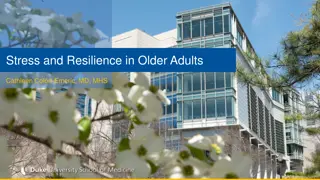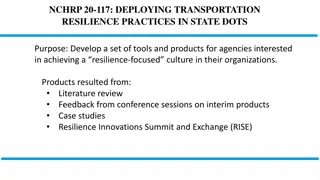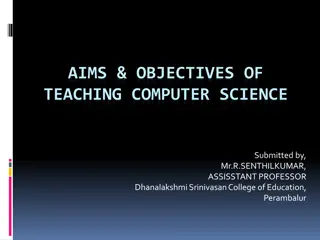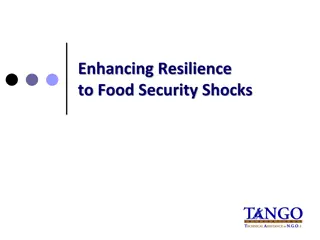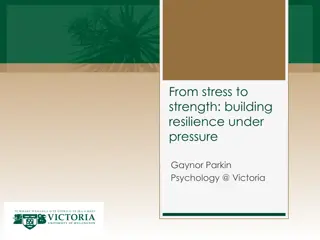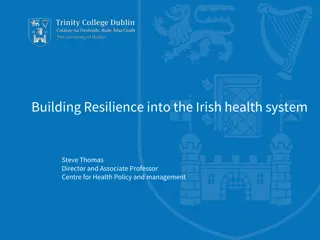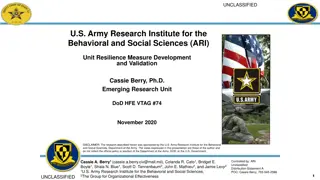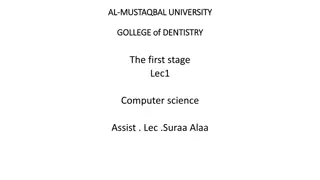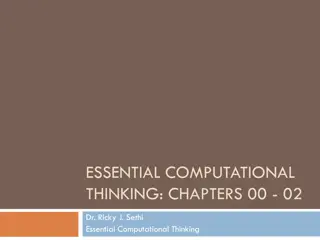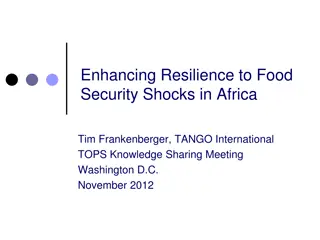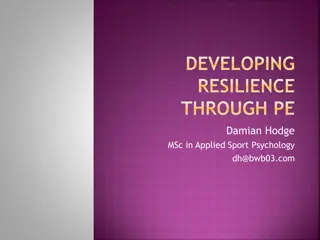Exploring Resilience in Computer Science Education: A Preliminary Study
This study examines the relationship between resilience and effective learning in Computer Science education using the Grit Scale and Nicholson McBride Resilience Quotient. Research methods, findings, and implications are presented based on data from a first-year BSc/MComp cohort, with insights into the predictive significance of these measures. The study reveals varying results in correlation and logistic regression analyses, providing valuable insights for future research in this area.
Download Presentation

Please find below an Image/Link to download the presentation.
The content on the website is provided AS IS for your information and personal use only. It may not be sold, licensed, or shared on other websites without obtaining consent from the author. Download presentation by click this link. If you encounter any issues during the download, it is possible that the publisher has removed the file from their server.
E N D
Presentation Transcript
Cambridge Computing Education Research Symposium 2020 Exploring Resilience for Effective Learning in Computer Science Education Tom Prickett1, Tom Crick2, Morgan Harvey3, Julie Walters1and Longzhi Yang1 1Department of Computer and Information Sciences, Northumbria University 2School of Education/Department of Computer Science, Swansea University 3Information School, University of Sheffield
Overview Background and Context Research Methods Findings Limitations and Constraints Conclusions and Implications References
Your thoughts: https://bit.ly/CambridgeResilienceFeedback Background and Context Computer Science is challenging and learning programming particularly challenging [1][6] Grit 12-Item Scale: the passion and perseverance for a singularly important goal [3] https://angeladuckworth.com/grit- scale/ (This is the 10 point scale -we use the 12 point scale) Nicholson McBride Resilience Quotient: quality that helps you turn adversity into advantage and threat into opportunity [2] We use short 12 question version (https://bit.ly/CambridgeNMRQ ) Maintaining effective learning requires competence and resilience [4][5][10] This is a preliminary study into two measures of positive psychology [8] and student success: Duckworth s 12-item Grit Scale [3] and Nicholson McBride Resilience Quotient (NMRQ) [2]
Your thoughts: https://bit.ly/CambridgeResilienceFeedback Research Methods A first-year BSc(Hons)/MComp Computer Science cohort. Ethical approval obtained In February 2019 students completed the two surveys in a lecture via the University s electronic learning platform Students were: Provided their results Interpretation of their results Guidance provided and further support offered Consent explicitly gained At end of year subject marks and attendance obtained Sample size Grit: N=58 Resilience: N=50 Analysis 1. Correlation Analysis 2. Exploration of predictive strength via logistic regression We are not building a predictive model
Your thoughts: https://bit.ly/CambridgeResilienceFeedback Findings -Grit Correlation Analysis Not statistically significant at 1% level Similar outcome for Logistic Regression More details in our forthcoming ITiCSE 2020 paper [7]
Your thoughts: https://bit.ly/CambridgeResilienceFeedback Findings -Grit Correlation Analysis Statistically significant at 1% level Logistic Regression suggests there is a predictive significance More details in our forthcoming paper [7]
Your thoughts: https://bit.ly/CambridgeResilienceFeedback Limitations Single institution Sample size not large enough for consideration of other factors (for example, gender) Higher education / first-year of a degree Risk of identification of individual students Correlation not causation Small sample size Sample bias -non attendees Solely quantitative study
Your thoughts: https://bit.ly/CambridgeResilienceFeedback Conclusions and Implications Possible further work: i) Initiatives related to the active development of student resilience can be deployed and evaluated ii) Replicating the study with larger cohorts and at other schools / colleges /universities to validate, increasing the sample size and strengthening the statistical basis. iii) Using resilience in predictive models alongside other key factors in order to further augment and enhance the prediction of student success. 12-item resilience scale could be a factor in promoting success Not true for the 12-item grit scale Consistent with other work [9] A number of possibilities for future work related to: Transition learner attitudes, behaviours and dispositions, teaching and assessment
References [1] Jens Bennedsen and Michael E. Caspersen. 2019. Failure Rates in Introductory Programming: 12 Years Later. ACM Inroads 10, 2 (April 2019), 30 36. https://doi.org/10.1145/3324888 [2] Jane Clarke (2010). Resilience: bounce back from whatever life throws at you. Crimson Publishing, USA. [3] Angela L Duckworth, Christopher Peterson, Michael D Matthews, and Dennis R Kelly. 2007. Grit: perseverance and passion for long- term goals. Journal of personality and social psychology 92, 6 (2007), 1087. https://doi.org/doi/10.1037/0022-3514.92.6.1087 [4] Sarah Holdsworth, Michelle Turner, and Christina M. Scott-Young. 2018. . . .Not drowning, waving. Resilience and university:a student perspective. Studies in Higher Education 43, 11 (2018), 1837 1853. https://doi.org/10.1080/03075079.2017.1284193 [5] Ann S. Masten and J. Douglas Coatsworth. 1995. Competence, resilience, & psychopathology. In Wiley series on personality processes. Developmental psychopathology, Vol. 2. Risk, disorder, and adaptation, D. Cicchetti & D. Cohen (Ed.). Vol. 2. Wiley, New York, 715 752 [6] Leo Porter, Cynthia Bailey Lee, and Beth Simon. 2013. Halving Fail Rates Using Peer Instruction: A Study of Four Computer Science Courses. In Proceeding of the 44th ACM Technical Symposium on Computer Science Education (Denver, Colorado, USA) (SIGCSE 13). ACM, New York, NY, USA, 177 182. https://doi.org/10.1145/2445196.2445250 [7] Tom Prickett, Morgan Harvey, Julie Walters, LongzhiYang and Tom Crick, 2020, Resilience and Effective Learning in First Year Undergraduate Computer Science, In Proceedings of the 2020 ACM Conference on Innovation and Technology in Computer Science Education(ITiCSE 2020). ACM In Press [8] Martin E. P. Seligman. 2006. Learned Optimism: How to Change Your Mind and Your Life. Vintage, USA [9] Nikki Sigurdson and Andrew Petersen. 2018. An Exploration of Grit in a CS1 Context. In Proceedings of the 18th KoliCalling International Conference on Computing Education Research (Koli, Finland) (KoliCalling 18). ACM, Article 23, 23:1 23:5 pages. https://doi.org/10.1145/3279720.3279743 [10] Caroline Walker, Alan Gleaves, and John Grey. 2006. Can students within higher education learn to be resilient and, educationally speaking, does it matter? Educational Studies 32, 3 (2006), 251 264. https://doi.org/10.1080/03055690600631184
Any questions? Questions by email welcome to: Your thoughts also welcome at: https://bit.ly/CambridgeResilienceFee dback Tom Prickett, Northumbria University tom.prickett@northumbria.ac.uk Tom Crick, Swansea University thomas.crick@swansea.ac.uk





